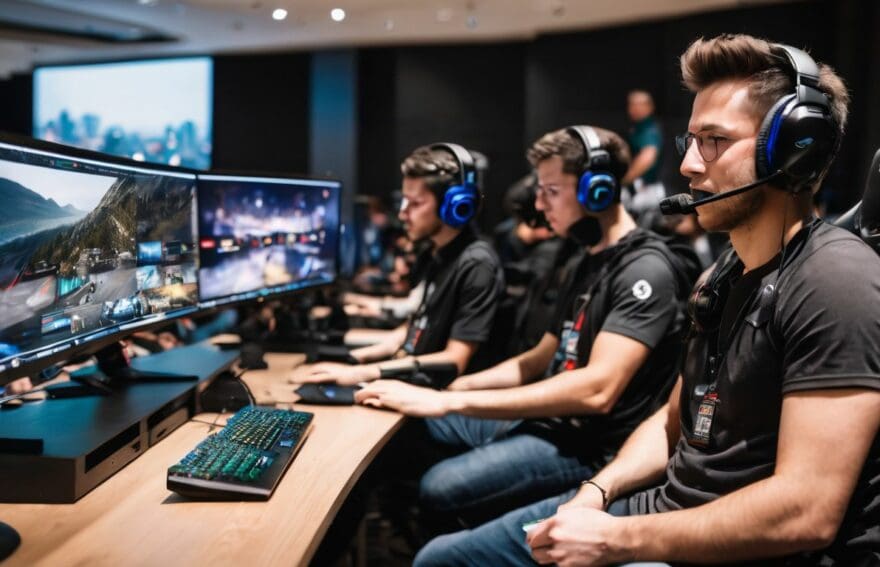Esports and Education: Teams Partnering with Academic Institutions

Updated On: October 30, 2025 by James Connolly
Have you ever caught yourself pondering how the exhilarating world of esports might slot into the traditional educational landscape? It’s a question that’s had us scratching our heads too.
After thoroughly exploring this contemporary marvel, we’ve discovered that esports could well be a pivotal player in the academic field. Our blog is brimming with fascinating details on collaborations between academia and esports contingents — partnerships which are transforming the educational experience for students such as yourselves.
Learn why your very own school might be on the cusp of embracing this thrilling new frontier!
The Rise of Esports in Education
Esports, or competitive gaming, has gained popularity in educational institutions for its ability to develop critical thinking and teamwork skills. With the rise of esports leagues and tournaments, schools are beginning to see the benefits of integrating esports into their curriculum and extracurricular activities.
Definition of esports
Esports takes the form of organised, multiplayer video game competitions, particularly between professional players, individually or as teams. Picture intense battles in virtual realms where skill, strategy and quick reflexes rule supreme.
These contests are not just casual gaming sessions; they’re akin to traditional sports with leagues, tournaments and massive audiences tuning in both online and offline.
We see this digital sport growing by leaps and bounds within educational settings, offering students from high schools to colleges a platform to shine competitively while fostering skills like teamwork and strategic thinking.
It’s thrilling for us gamers to witness our passion for competitive gaming being embraced as part of school curriculums across the globe. Through esports programmes, institutes are nurturing new generations of tech-savvy individuals who might one day become leading professionals in the dynamic world of gaming and beyond.
Benefits of esports in education
Expanding on our understanding of esports, we can now delve into the benefits it brings to education. As passionate gamers and novice players, you’ll find that:
- Esports teaches valuable skills like teamwork, communication, creative thinking, and digital literacy that are essential for success in both gaming and academic pursuits.
- Engaging in extracurricular esports activities offers opportunities to build a strong community, learn life lessons, and acquire crucial skills that extend beyond the game itself.
- It provides a social experience, fostering a sense of inclusion and belonging among passionate gamers within educational institutions.
- Developing ties with local high schools through esports can serve as a recruitment channel for scholarship programs, offering promising prospects for student success.
- The discipline and dedication required for competitive esports play are invaluable traits that can be transferred to academic studies, reinforcing students’ work ethic and drive for achievement.
How to start an esports team
- Identify potential teammates with a diverse set of skills and gaming expertise, fostering a well-rounded team.
- Establish regular practice schedules to hone individual and team-based skills, promoting discipline and dedication.
- Seek out local or online gaming leagues to compete in, gaining valuable experience and exposure within the esports community.
- Develop a clear team identity and branding, creating a cohesive image that resonates with both players and fans.
- Engage with other established teams and organisations to learn from their experiences and gain insights into the broader esports landscape.
- Strategise how to obtain funding or sponsorships to support equipment, travel expenses, and other logistical needs for competitions.
Partnerships between Esports Teams and Academic Institutions
Academic institutions are increasingly forming partnerships with professional esports teams to provide opportunities for students. One example is the collaboration between Ball State University and Gen.G Global Academy, highlighting the importance of such partnerships for growth opportunities in the esports industry.
Case study: Ball State University and Gen.G Global Academy
Ball State University and Gen.G Global Academy partnered to launch an esports management program, offering students the chance to pursue careers in the growing esports industry. The collaboration provides students with innovative educational opportunities, blending traditional sports management knowledge with the unique requirements of managing an esports team.
This partnership aims to offer both theoretical and practical learning experiences through a curriculum tailored specifically for the industry’s demands.
The initiative also features a varsity-level competitive esports team that represents Ball State University in tournaments conducted by CSL and other collegiate leagues. Students involved can gain essential skills related to leadership, teamwork, strategic planning, and project management while competing at a high level within the college gaming community.
Importance of partnerships for growth opportunities
Partnerships with academic institutions offer significant growth opportunities for esports teams. Collaborating with schools and universities provides access to resources, facilities, and potential funding.
These partnerships can also lead to the development of educational programmes, scholarships, and pathways to careers in the gaming industry. Academic tie-ups help esports teams reach a wider audience, attract top talent, and foster a supportive environment for aspiring gamers.
Furthermore
Esports Grants for Schools
Grand Canyon University has been offering esports grants to high schools, enabling them to develop their own esports programs. Such grants have a significant impact on the future of esports by fostering growth and development at the grassroots level.
Grand Canyon University’s esports grant for high schools
Grand Canyon University is making a significant impact in the world of high school esports through its grant program. This initiative offers financial support to high schools interested in building or advancing their esports programs, providing students with opportunities to develop their skills and passion for gaming.
The grant not only supports the growth of esports at the high school level but also promotes diversity and inclusion, creating pathways for underrepresented groups within the gaming community.
By partnering with Grand Canyon University, high schools can cultivate an environment that fosters teamwork, critical thinking, and digital literacy among students. Additionally, this grant opens doors for aspiring gamers who may not have had access to such opportunities before.
Impact of such grants on the future of esports
Esports grants for schools play a significant role in shaping the future of competitive gaming. These grants provide crucial financial support, enabling educational institutions to build robust esports programs and infrastructure.
As a result, passionate gamers have greater opportunities to hone their skills and pursue their passion for gaming within an academic setting. Notably, the availability of such grants encourages inclusivity and diversity in esports by providing access to resources that may otherwise be out of reach for many students.
By leveraging these grants, schools can foster a nurturing environment where aspiring gamers can thrive and develop essential life skills through competitive gaming. Furthermore, with improved access to training facilities and equipment, students are better equipped to compete at higher levels, ultimately elevating the standard of esports across educational institutions.
Why Educational Institutions Should Develop Esports Programs
Educational institutions should develop esports programs to attract prospective students and prepare them for success in the gaming industry. The development of these programs can also provide opportunities for scholarships, internships, and other initiatives that support diversity and inclusion in esports.
Attracting prospective students
Esports programs in educational institutions attract prospective students by offering opportunities to pursue their passion for gaming while obtaining an education. With the growing popularity of esports, schools that develop these programs can appeal to a wider pool of potential students who are avid gamers and seek a supportive community that shares their interests.
Furthermore, promoting esports initiatives can also serve as a unique selling point for academic institutions, distinguishing them from others and drawing in individuals passionate about both gaming and higher education.
These programs not only create a sense of belonging but also provide avenues for student scholarships and engagement within the school environment.
Preparing students for success in the gaming industry
Esports programs in educational institutions help students develop the skills needed for success in the gaming industry. Through teamwork, communication, and digital literacy gained from esports activities, students are better prepared to thrive in a competitive and fast-paced gaming environment.
Academic partnerships provide opportunities for aspiring gamers to gain real-world experience and practical knowledge that can set them apart in the industry.
Students involved in collegiate esports also have the chance to hone their discipline and dedication as they spend hours perfecting their craft. By participating in leagues like the Collegiate Star League (CSL), passionate gamers can connect with like-minded individuals and broaden their networks within the gaming community.
How Technology Companies Support Esports in Education
Technology companies play a crucial role in supporting esports in education by providing technical and instructional support, creating opportunities for students through internships and initiatives, and promoting diversity and inclusion in the esports industry.
These partnerships help to foster growth and development within the esports community while also preparing students for success in the gaming industry.
Providing technical and instructional support
Esports teams coalesce with academic institutions, requiring technical and instructional support to nurture their esports programs. Educational initiatives should focus on integrating gaming technology into the curriculum effectively, fostering digital literacy among students.
The provision of comprehensive resources and training for educators is essential in facilitating the development of esports in school programs, ensuring that passionate gamers receive the necessary guidance while promoting inclusivity within educational institutions.
Technical companies play a pivotal role by providing equipment, software, and instructional materials to empower schools’ gaming endeavors. Initiatives such as internships and mentorship opportunities enrich students’ practical experiences, contributing to the growth of esports in education.
Gaming industries collaborate with schools by sharing expertise through workshops and seminars geared towards enhancing students’ skills in critical areas like coding and game design.
This proactive approach fosters a symbiotic relationship between academia and technology firms that underpins the elevation of esports in educational settings.
Creating opportunities for students through internships and initiatives
Technology companies actively support esports in education by providing technical and instructional support. This collaboration extends beyond the classroom, creating opportunities for students through internships and initiatives.
With a focus on promoting diversity and inclusion in esports, these partnerships offer valuable hands-on experience for passionate gamers while also bolstering their professional skill set.
These initiatives align with educational institutions’ goal of preparing students for success in the gaming industry, offering real-world opportunities to apply what they’ve learned.
Promoting diversity and inclusion in esports.
Esports offers a platform for players from diverse backgrounds to come together and compete on an equal footing. This diversity enriches the gaming experience, fostering a sense of inclusivity and understanding among players.
Embracing diversity in esports not only enhances the community but also encourages innovation and creativity, broadening perspectives within the gaming industry.
Inclusion in esports provides opportunities for individuals with different abilities, genders, ethnicities, and cultures to participate and excel in competitive gaming. By promoting diversity and inclusion in esports, we create an environment that celebrates varied voices and talents while providing avenues for underrepresented groups to thrive.
Conclusion
In conclusion, partnerships between esports teams and academic institutions offer valuable growth opportunities. Educational institutions should consider developing esports programs to attract prospective students and prepare them for success in the gaming industry.
Technology companies play a crucial role by providing support and creating diverse opportunities for students through internships and initiatives.
FAQs
1. What does it mean for esports teams to partner with academic institutions?
When esports teams partner with schools, they work together to include esports in the school curriculum and support education through gaming.
2. How do partnerships between esports teams and schools help students?
These partnerships can enhance students’ learning by adding fun and interactive elements from video games into their studies, which helps them learn new skills.
3. Can you study esports in higher education?
Yes, many colleges now offer classes on esports as part of their courses, giving students a chance to explore gaming at a more advanced level.
4. Will having an esports curriculum really benefit my future career?
Absolutely! Learning about Esports can teach you valuable skills like teamwork and problem-solving that are important for lots of different jobs out there.



